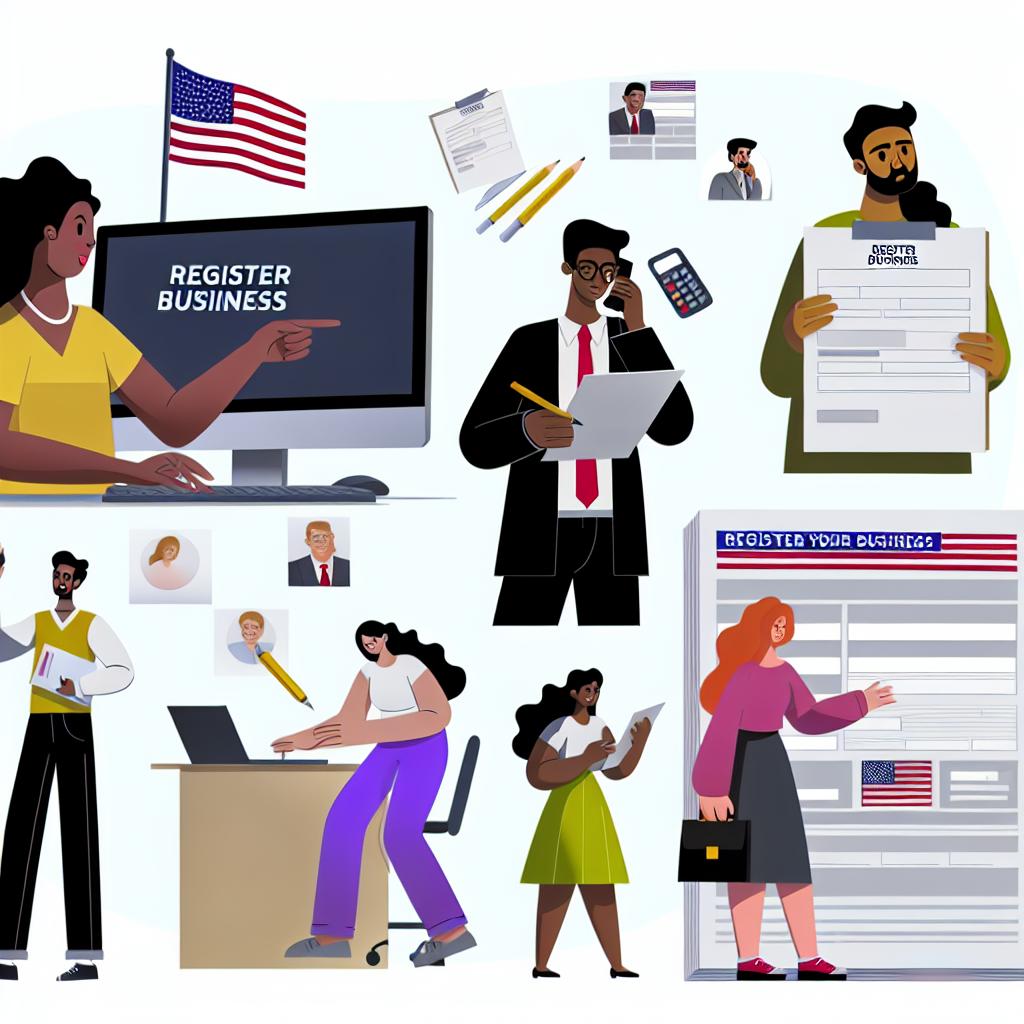
Legal Requirements for Starting a Business in the U.S.
Business Structure Selection
When embarking on the journey of starting a business in the U.S., one of the essential steps to undertake is selecting an appropriate business structure. This decision holds significant weight as it influences various operational elements including taxation, required documentation, and personal liability. Choosing the wrong structure at the beginning can lead to unforeseen complications in the future, such as excessive taxes or increased personal risk. Thus, understanding each option is vital in making an informed decision for setting a strong foundation for your venture.
**Sole Proprietorship**
A sole proprietorship is the most straightforward business structure available. It involves a single individual owning and operating the business. One of the main advantages of a sole proprietorship is its simplicity; there’s minimal paperwork to file, and the owner has complete control over all business decisions. However, this also means that the owner bears full responsibility for any debts or liabilities the business incurs. Personal assets are not protected, making it essential to weigh the risks involved.
**Partnership**
For those who plan to enter into business with one or more people, a partnership might be the ideal choice. Partnerships can be straightforward in terms of setup but do require a formal agreement. This agreement should clearly outline the responsibilities, contributions, and profit-sharing ratios of each partner. While partnerships allow for shared responsibility and combined expertise, they also entail shared liabilities, making it crucial to choose partners wisely and legally document the operational procedures.
**Limited Liability Company (LLC)**
An LLC is often favored by entrepreneurs due to its flexible nature. It blends elements of a corporation and a partnership, offering personal liability protection to its owners while avoiding the double taxation seen in corporations. Members of an LLC are not personally liable for business debts, which provides security in case of financial downturns or legal challenges. The paperwork is more involved than a sole proprietorship but less cumbersome than incorporating a business.
**Corporation**
Corporations are complex and formal structures that provide the strongest liability protection for its owners, who are typically the shareholders. They operate as separate legal entities, which shields personal assets from business liabilities. However, this structure features double taxation; profits are taxed at the corporate level, and dividends are taxed again on the shareholders’ personal tax returns. Establishing a corporation requires substantial paperwork, and is generally ideal for larger businesses with significant funding or multiple employees. Forming an S Corporation can provide relief from double taxation but comes with specific IRS regulations.
Registering Your Business
After deciding on a business structure, the next critical step is registering your business with the appropriate government bodies. This registration legitimizes your business and enables you to operate legally within the U.S. The process may appear daunting, but breaking it down into simple, actionable steps can ease the burden. The specific requirements for registration can vary by state, so it’s important to conduct thorough research relevant to your location.
Choose an Available Name
The first step in the registration process is selecting a business name. It must be unique and not already in use by another registered business. Most states offer online databases where you can verify the availability of your proposed business name. Additionally, there might be naming guidelines you need to comply with, such as avoiding certain words in your business title.
File the Necessary Paperwork
The type of paperwork required depends largely on the business structure you have chosen. For instance, a corporation would need to file Articles of Incorporation, while an LLC must file Articles of Organization. These documents are submitted to the state’s business division, usually a part of the Secretary of State’s office. Ensuring that every detail in these documents is correct is crucial for successful registration.
Obtain an Employer Identification Number (EIN)
The EIN functions like a social security number but for your business. It’s primarily used for tax purposes by the IRS. Any business entity employing workers, operating as a corporation, or involved in certain types of organizations will require an EIN. Sole proprietorships without employees may not need one, though having an EIN can provide some privacy by allowing the use of the EIN instead of a personal social security number on various forms.
Licenses and Permits
Operating a business in the U.S. often necessitates obtaining various licenses and permits, depending on the type of industry, location, and operational scope. Acquiring these is a critical step to ensure that your business activities comply with the law.
**General Business License**
A general business license is a basic requirement for most businesses. It signals to local authorities that you’re legally allowed to conduct business within their jurisdiction. The procedures and fees associated with obtaining this license vary by location.
**Professional and Trade Licenses**
Certain professions mandate specific licenses to legally practice. These are professions where public safety and trust are critical, such as healthcare, law, or skilled trades like electrical or plumbing work. The regulatory boards for these professions often conduct background checks and require proof of qualification.
**Health and Safety Permits**
Industries that involve health, safety, or environmental considerations may need additional permits. Restaurants or cafes, for instance, must comply with food safety standards and health inspections. An environmentally-focused business might need to adhere to strict guidelines to minimize its impact on nature.
To navigate the complex web of licenses and permits, prospective business owners should consult local government websites or regulatory bodies that offer clear guidance on these requirements.
Taxation Considerations
An essential aspect of running a business, taxation can be intricate but must not be overlooked. Understanding your tax obligations helps you avoid penalties and ensures smooth financial operations.
Federal Taxes
At the federal level, businesses are subject to different tax responsibilities, which may include income tax, self-employment tax, or payroll tax, depending on the structure and scope of the business. Registering your business with the IRS is a necessary step for managing these obligations effectively.
State and Local Taxes
Beyond federal taxes, states may levy additional taxes on businesses. Sales taxes are prevalent in states that have them, meaning businesses must charge extra on the goods and services they sell. Property tax might affect businesses owning real estate, and overall tax rates and regulations can vary significantly from one locality to another, necessitating detailed, location-specific tax planning.
Employment Taxes
Employers need to handle a variety of employment taxes. This typically includes withholdings for federal and state income taxes, and contributions to Social Security and Medicare, both from employer and employee sides. Proper management of these withholdings is critical for compliance and regular payroll operations.
The IRS website offers valuable resources to help you navigate the tax landscape, providing detailed guidelines tailored for different business types and structures.
Compliance and Ongoing Responsibilities
Once your business is up and running, maintaining compliance involves more than adhering to initial regulations. It’s a continuous process, requiring ongoing attention to various operational requirements.
**Annual Filings**
For corporations and LLCs, annual filings are often mandatory. These filings might include details about changes in ownership or business address and usually come with a nominal fee. They ensure that the state has up-to-date information about your business and compliance with regulatory requirements.
**Records Maintenance**
Maintaining precise and detailed records of day-to-day business operations, financial transactions, and strategic decisions is both a legal necessity and a best practice. These records support the production of financial statements, IRS audits, and can also inform strategic decision-making.
**Renewal of Licenses and Permits**
Licenses and permits are typically issued with an expiration date and must be renewed periodically. This process usually involves paying fees and occasionally providing additional documentation or inspections. Monitoring these dates and preparing for renewals in advance prevents interruptions in business operations.
Proactively managing these responsibilities contributes to overall business health and minimizes potential legal issues. Many resources are available to entrepreneurs seeking guidance on compliance, including the Small Business Administration (SBA), which offers a treasure trove of information and support tools specifically geared toward small and growing businesses.
While establishing and running a business involves numerous steps and challenges, understanding these fundamental aspects helps pave a path toward successful entrepreneurship. As you navigate through these processes, ensuring compliance with existing laws and maintaining organized business operations will support your venture’s long-term viability and success.


